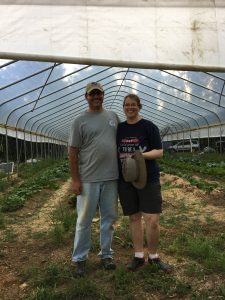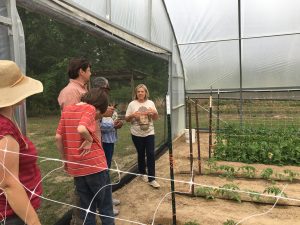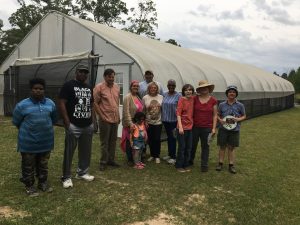Final report for SAL17-001
Project Information
Alabama has a rapidly growing vegetable industry with increasing number of farmers entering the local food systems.
The Alabama SARE program, initiated in 2010, is one of the strongest educational programs in the state and region; the PI and extension agents annually train nearly 1,000 producers statewide. About 20 percent participants trained annually are from the under served or underrepresented communities. This Auburn University proposal aims at
continuing the high tunnel crop production and pest management educational program that can significantly reduce
crop losses. Through on-farm field demonstration of integrated pest management tactics (pest exclusion + microbial
control+ insect monitoring tactics), producers, extension agents, and technical service providers will get hands-on
training for immediate impacts. We will be documenting project impacts using our robust evaluation system and
publishing results in the form of written report and impact video.
Although the Alabama SARE program emphasizes on pest management aspects, the events we organize generally incorporate crop production, irrigation, and food safety training as well. Our events are evaluated carefully for quality and impacts; these are reported annually to SARE. Following are the proposal objectives:
• Establish four pest exclusion demonstrations in the northeast and northwest Alabama including the Black Belt
Region (targeting 20 percent diversity of audience). These high tunnels will be monitored using insect pheromone
traps and scouted weekly by the PI and farmers.
• Conduct four high tunnel/IPM meetings at demonstration locations with extension agents and farmers. We wish to
open the event for educators from all three LG institutions in Alabama.
• Continue to update critical IPM publications like the High Tunnel Crop Production Handbook and Alternative
Vegetable IPM slide chart that are critical training resources for farmers. We will also produce one impact video
on HTPE technology with grower testimonial with the proposed funding.
Advisors
- (Educator)
- (Educator)
- (Educator)
- (Educator)
- (Educator)
- (Educator)
- (Educator)
Education
Educational approach:
The Alabama SARE program has been instrumental in successfully starting and expanding the organic crop production movement statewide since 2010. With the high incidence of insect pests and diseases due to suitable weather, producers have created a pull on the program instead of Extension pushing information. The Alabama SARE program has developed a four step technology transfer model emphasizing on information & technology awareness, technology demonstration, technology refinement (service), and technology adoption and impacts. Educational materials developed from SARE funds have not only trained educators within the Extension System, but also benefited agencies such as the NRCS, FSA, and mentor farms that are using the IPM publications and online resources quite extensively. At present, the major IPM technologies include training on pest exclusion methods using 50% shade cloths (for large moth pests and leaffooted bugs), super light insect barrier (for small insects), and organic insecticide as needed for preventing insect outbreaks inside high tunnels. A major effort of the Alabama SARE program is also direct on-farm visits and consultations that lead to highest impacts due to urgency to protect crop failure and/or contamination.
Education & Outreach Initiatives
Establish four pest exclusion demonstrations in the northeast and northwest Alabama including the Black Belt Region (targeting 20 percent diversity of audience). These high tunnels will be monitored using insect pheromone traps and scouted weekly by the PI and farmers.

We were able to install 50% shade cloth at two locations in the northeast and west Alabama to demonstrate the effectiveness of woven netting as a simple pest exclusion material to stop large moth pests and leaffooted bugs. Details about this permanent pest exclusion system is available at http://www.aces.edu/anr/ipm/Vegetable/HTPE.php and a new SARE bulletin is also available on the topic, see https://www.southernsare.org/News-and-Media/Regional-Resources/Regional-Bulletins/High-Tunnel-Pest-Exclusion-System-HTPE/High-Tunnel-Pest-Exclusion-System-Part-II.
The HTPE system has really proven effective across all 10 demonstration locations (two locations in 2018) with 70% or more reduction in large moths like loopers, armyworms, and fruitworms; this reduction in moths results in over 50% reduction of caterpillars and major quality improvement of high value crops inside high tunnels. There was nearly 100% elimination of the hornworm moths resulting in no caterpillar outbreaks.
Continue to update critical IPM publications that are critical training resources for small farmers.
We took this opportunity to do a major update of the Organic Vegetable IPM Slide Chart and reprint several thousand copies for circulation in Alabama and the Southeast farmers. We also developed an Urban Farm IPM Toolkit (wheel slide chart) with 20 different crops and 50 insect pests along with color pictures. Photos of these publications can be seen at http://www.aces.edu/anr/ipm/Vegetable/. All publications acknowledge SARE funding on the front.
About 26% participants surveyed use the Organic Vegetable IPM slide chart and the new version has just been circulated. Since this updated version has more information, we anticipate high circulation of this publication. The Urban Farm IPM Toolkit is a new product and hasn't been evaluated yet. We do know that there is a high demand for the urban IPM toolkit due to growth in urban areas in Alabama and in the proximity of Atlanta. We provide these publications free of charge to all producers.
We conducted over 30 workshops statewide across Alabama and the southeast to emphasize the correct use of specialty crop production and IPM tactics.


Hands-on workshops lie the one in the picture attract many producers from minority farms, veterans interested in agriculture, and educators from nonprofit organizations that are critical part of the information dissemination system.
Hands-on training event on small farms were a great success with producers taking the lead in showing the benefits and impacts of SARE program and IPM demonstrations. All participants received free handouts and peer-reviewed extension publications.
Educational & Outreach Activities
Participation Summary:
Learning Outcomes
Project Outcomes
- Survey return rate at workshops = 60% (161 participants from 28 counties in Alabama); growers with 19 high tunnels and 1,425 production acres (conventional, naturally grown and and certified organic)
- Nature of audience (62% new attendees): 29% beginning farmers, 7% experienced producers, 13% naturally grown, 20% transitioning producers, 16% educators and consultants, and 13% urban and community gardeners
- Major information sources: 4% social media, 40% grower conferences, 30% extension IPM newsletter, 40% word-of-mouth; 13% event flyers; 13% other sources like TV and radio spots
- Publication usage: 22% SE Vegetable Production Handbook; 26% organic IPM slide chart; 24% Home Garden IPM; 4% Crucifer IPM Guide
- 90% increase in awareness about organic farming and pest management after workshop
- 88% satisfaction rating from workshops
- 96% adoption rate for IPM information receiving direct crop consultation; value of impact is about $250 to 500 per acre for specialty crops. Return on investment is estimated to be between $36 to $59 for every dollar invested.
- 55% crop loss without IPM plan or implementation
Face of SARE
The Alabama SARE program at Auburn University was initiated in 2010 and it has greatly evolved since then with statewide demonstrations of specialty crop production and IPM techologies. AU SARE program provides training to growers, extension agents, crop advisers, and nonprofit educators via direct field training and webinars, regular pest alerts (Alabama IPM Communicator e-newsletter), bulletins and podcasts. There is a complex communication and evaluation strategy behind the entire program for the careful documentation of outcomes and impacts. Information about the high tunnel pest exclusion system (http://www.aces.edu/anr/ipm/Vegetable/HTPE.php) that was developed here and actively demonstrated on 10 farms across Alabama with four new additions has been very well received. Southern SARE has a webpage dedicated to HTPE and it can be found at http://www.southernsare.org/News-and-Media/SSARE-Bulletins/High-Tunnel-Pest-Exclusion-System-HTPE. Some of the SARE-funded IPM publications such as the Organic Vegetable IPM Slide Chart, Urban IPM wheel slide chart, and the High Tunnel Crop Production Handbook for New and Beginning Farmers (also an eBook) are the most circulated educational publications in the Southeast. The future phases of the AU SARE program will continue to focus on beginning farmers among the military veterans and underserved communities who need on-farm assistance for information and/or transitioning to organic systems.